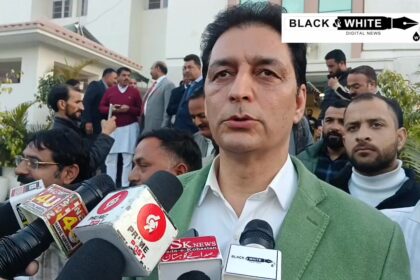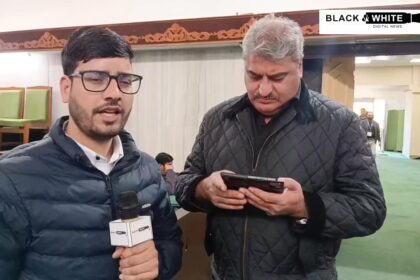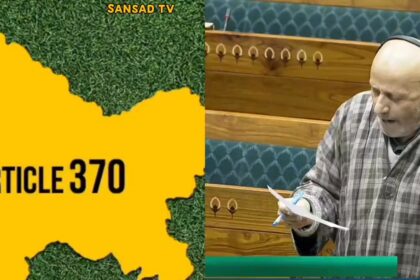Daily Wagers in J&K: A Crisis of Governance and Political Apathy
BJP Deflects, NC Blamed, But What Happened to BJP’s Own Pre-Election Report?
For the First Time, Daily Wagers Cross Barricades in Desperation
||Black and White Digital News ||
||Parvinder Singh March 25,2025 ||
Jammu and Kashmir’s daily wagers have long been victims of political neglect. Despite years of assurances, their struggle for regularization remains unresolved. In a historic first, frustrated workers crossed police barricades in their latest protest, signaling growing unrest. While the BJP now shifts the blame onto the National Conference (NC), questions remain: What about the report and committee the BJP itself set up before elections to address the issue? Why is the government unwilling to create a concrete policy for their regularization?
BJP’s Own Report Before Elections—Now Buried?
In a strategic move before elections, the BJP had formed a committee to study and recommend solutions for the plight of daily wagers. This committee was projected as a serious effort to address their concerns. However, post-election, the report seems to have been conveniently sidelined. The BJP, which had championed the cause while in campaign mode, now appears reluctant to take any decisive steps. Instead, its leadership is accusing previous NC and PDP governments of inaction—a classic case of political blame-shifting.
A Timeline of Political Inaction: NC, PDP, and BJP’s Role
1. National Conference (NC) Government:
• NC governments over the decades have seen protests by daily wagers but have failed to create a comprehensive regularization policy.
• While promises were made in election manifestos, actual implementation was negligible.
2. PDP Government:
• The PDP government did initiate some steps toward regularization, but these were partial and failed to provide a long-term solution.
• Bureaucratic red tape and financial constraints were often cited as roadblocks.
3. BJP Government:
• After coming to power in J&K (in coalition with PDP), the BJP had an opportunity to deliver on its pre-election commitments.
• Instead of implementing structural reforms, the government merely extended temporary relief measures, leaving the core demand unfulfilled.
• Now, under LG rule—where the BJP wields influence—there is still no concrete movement toward resolving the crisis.
Why Is the Government Hesitant to Regularize Daily Wagers?
Despite repeated protests, why is there no policy for regularizing daily wagers? The reasons appear to be a mix of financial constraints, administrative reluctance, and political calculations:
1. Financial Burden Argument: Successive governments claim that absorbing thousands of daily wagers into permanent government jobs would be an unsustainable financial burden.
2. Precedent Effect: Fulfilling the demands of daily wagers could encourage other contractual and temporary workers to demand the same treatment.
3. Bureaucratic Resistance: The administration benefits from a contractual workforce that offers greater flexibility in hiring and firing, reducing long-term commitments.
4. Political Strategy: Daily wagers remain a convenient election issue, and successive governments have preferred keeping them as a dependent vote bank rather than offering a permanent resolution.
Parliament’s Salary Hike vs. Daily Wagers’ Struggles: A Tale of Two Realities
In a stark display of governance priorities, while daily wagers are left in limbo, the Indian Parliament has proposed an increase in the salaries and allowances of Members of Parliament. This raises ethical concerns—if financial constraints are cited as a reason for not regularizing daily wagers, why is there no such hesitation in increasing benefits for lawmakers? The disparity highlights the growing disconnect between political leadership and the working-class population.
What Happens Next?
The daily wager crisis in J&K has reached a tipping point. With rising frustration, protests are becoming more intense. If the government continues to ignore the issue, it risks facing larger and more aggressive demonstrations in the near future. The real question is:
• Will the government finally take a decisive step, or will it continue to pass the responsibility between parties?
• Will BJP revisit its own committee’s findings and implement the promised reforms?
• How long will daily wagers have to struggle while politicians ensure their own financial security?
As the situation intensifies, one thing is clear the issue can no longer be swept under the rug. The government must act, and it must act now.
Leave a comment
You Might Also Like
MLA Shakti Parihar Says Every Legislator Highlighted Development Issues of Their Respective Constituencies While Discussing Grants
MLA Shakti Parihar Says Every Legislator Highlighted Development Issues of Their Respective Constituencies While Discussing Grants
0 Min Read
Exclusive Conversation With Mla Banihal Gool Sajjad Shaheen
Exclusive Conversation With Mla Banihal Gool Sajjad Shaheen
0 Min Read
Article 370 Hum Wapis Lekar Rehege Aapko Wapis Krna He Hoga MP Er Rashid
Article 370 Hum Wapis Lekar Rehege Aapko Wapis Krna He Hoga MP Er Rashid
0 Min Read
Mir Saifullah MLA Tregham Ne Kaha National Conference Koshish Kar Rahi Hai Logon K Issues Hal Kiye Jaye
Mir Saifullah MLA Tregham Ne Kaha National Conference Koshish Kar Rahi Hai Logon K Issues Hal Kiye Jaye
0 Min Read









